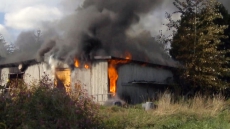Experts say modern technology has made Canada's already efficient Amber Alert system even more effective in recent years.
Christy Dzikowicz of the Canadian Centre for Child Protection says smartphones and social media ensure that key details, such as descriptions of children believed to be in danger, reach people who are on the go and more likely to note suspicious activity than someone confined at home.
She says the recent presumed abduction of Alberta toddler Hailey Dunbar-Blanchette is a good example, noting word of her disappearance and a description of the vehicle in which she was last seen have circulated across the country.
Such wide-spread dissemination, she says, has made the system an extremely effective tool that helps recover kids in the vast majority of cases.
Dzikowicz says Canadians who see details of a missing child in their region need to ensure the system's effectiveness by acting on the information as best they can.
"People that are in their commute, that are sitting on a transit bus or on a subway...A lot of people hear this information and they go, 'oh my gosh, that's really sad,' as opposed to going, 'ok, this is awful, I'm going to keep my eyes open,'" Dzikowocz said in a telephone interview.
Canada's Amber Alert system has been implemented across all 10 Canadian provinces since 2004, though Dzikowicz says none of the territorial governments have put the system in place.
Amber Alerts were first launched in the United States after the 1996 abduction and murder of nine-year-old Amber Hagerman in Arlington, Texas.
The system, named after Hagerman and dubbed America's Missing Broadcast Emergency Response, was originally designed to interrupt TV and radio broadcasts with crucial facts about a child under 18 who was believed to be in danger from an abduction.

Dzikowicz says the Canadian provinces are each responsible for their own systems and originally followed the U.S. model very closely.
Over the years, however, Canadian criteria for an Amber Alert has been broadened in the wake of some high-profile cases, most notably the 2009 slaying of eight-year-old Tori Stafford from Woodstock, Ont.
For an Amber Alert to be triggered under the old criteria, police had to believe a child under 18 had just been abducted, consider the child to be in danger of serious bodily harm, and have enough descriptive information of a suspect or vehicle.
Under the new rules, ushered in after Stafford's death, police need only suspect, not confirm an abduction and are not required to have detailed descriptions of an abductor or vehicle.
The alert for Dunbar-Blanchette conforms to these new guidelines, since her alleged abductor or abductors are unknown and the vehicle in which she is believed to have been taken is only described as a white van with a large rear antenna sporting a flag.
Dzikowicz said another key distinction from the U.S. system is the way in which alerts are received.
American smartphone users receive automatic push notifications when an alert is issued in their region, but Canadians have to sign up to receive such services.
She urged Canadians to opt in and do their part when the time comes.
"We need to motivate people to really recognize that it's possible that they could be the one who finds this child."





